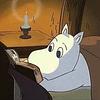Take a photo of a barcode or cover
Southern gothic is an itch that never goes away for me. In many ways it is inherently overwritten, conducive to “too-much description”, but it also typically forces writers in the genre to stylize themselves with my favourite kind of writing. Specificity, musicality, seriousness don’t close to melodrama it’d be funny, if there wasn’t so much nihilism. Almost always it has the secondary characters embody elements, or proponents of concepts that butt heads. There is no winning. Not for anybody. And it is generally masculine to show the toxicity of masculinity. Basically, It’s my cat nip.
A young black boy is found, claiming to be Lucifer fallen, spilling bible verse poetics rather than any kind of straight answers. And there’s murders about. As the odd one out you know the southern hospitality ends at the door for some kinds of folks. It won’t take much for them to come for the boy, and but he ends up finding shelter with our young boy protagonist, in a temporary sanctuary.
In the future we see our boy now grown. A haunted figure bowed with troubles and with no company at all. As the story progresses we bounce back and force as we come to know how and why our man has become truly broken. He too is quite poetic, endowing distance events with a mind that has thought about that summer every minute of everyday. He’s often melodramatic, but pulls it off, because there is a genuine sadness and self loathing coupled with the mystery that give the voice gravitas.
In finding out what happened to his family and what he can’t seem to forgive himself for, the story treads some southern staples. Coming-of-age, mostly. And its intersections. Queerness and racism are predominate, I think, but it casts so large a net, it is also more generally about the human condition and the day-to-day failures to be the person you want to be, and how the unintentional slights have just about as much heft as the more overt things that we call violence. It also struggles very much with faith. Everyone seems to have it but it doesn’t seem to add up to much, despite it being such a quintessential component in the way of life of these people. Really, it’s one of the first ways to form an in-group and an out-group.
And, of course, it’s about not accepting vulnerability and fallibility in other people—especially men—especially if you are a man yourself. Forgiveness and Justice a reckoning in this book. I suppose it’s only fitting that the Morningstar would be present.
A young black boy is found, claiming to be Lucifer fallen, spilling bible verse poetics rather than any kind of straight answers. And there’s murders about. As the odd one out you know the southern hospitality ends at the door for some kinds of folks. It won’t take much for them to come for the boy, and but he ends up finding shelter with our young boy protagonist, in a temporary sanctuary.
In the future we see our boy now grown. A haunted figure bowed with troubles and with no company at all. As the story progresses we bounce back and force as we come to know how and why our man has become truly broken. He too is quite poetic, endowing distance events with a mind that has thought about that summer every minute of everyday. He’s often melodramatic, but pulls it off, because there is a genuine sadness and self loathing coupled with the mystery that give the voice gravitas.
In finding out what happened to his family and what he can’t seem to forgive himself for, the story treads some southern staples. Coming-of-age, mostly. And its intersections. Queerness and racism are predominate, I think, but it casts so large a net, it is also more generally about the human condition and the day-to-day failures to be the person you want to be, and how the unintentional slights have just about as much heft as the more overt things that we call violence. It also struggles very much with faith. Everyone seems to have it but it doesn’t seem to add up to much, despite it being such a quintessential component in the way of life of these people. Really, it’s one of the first ways to form an in-group and an out-group.
And, of course, it’s about not accepting vulnerability and fallibility in other people—especially men—especially if you are a man yourself. Forgiveness and Justice a reckoning in this book. I suppose it’s only fitting that the Morningstar would be present.
McDaniel's use of language and imaginative storytelling stirred a range of emotions in me. A classic good v. evil story, this book is an allegory for current times.
Reading this book is an experience. The light magical surrealism and the tender way tough topics are broached is masterful. I was drawn in from page 1 and still haven't untangled myself from the story, even after the end of the book.
Don’t read this. It started at awful and ended at offensive.
Probably one of the saddest books I've ever read. I actually considered abandoning it, but the writing style, especially breathtaking imagery and metaphors, kept me going.
emotional
sad
medium-paced
Plot or Character Driven:
Character
Strong character development:
Yes
Loveable characters:
Complicated
Diverse cast of characters:
Yes
Flaws of characters a main focus:
Complicated
Oof. This just wasn't what I wanted it to be, and what it was was SAD, seemingly for no purpose, with some magical realism (maybe?) that didn't come together for me.
dark
mysterious
tense
medium-paced
Plot or Character Driven:
A mix
Strong character development:
Complicated
Loveable characters:
Complicated
Diverse cast of characters:
Yes
Flaws of characters a main focus:
Yes
dark
emotional
sad
medium-paced
Plot or Character Driven:
A mix
Strong character development:
Yes
Loveable characters:
Complicated
Diverse cast of characters:
Yes
Flaws of characters a main focus:
Yes
Graphic: Child death, Racism, Suicide







